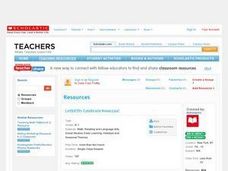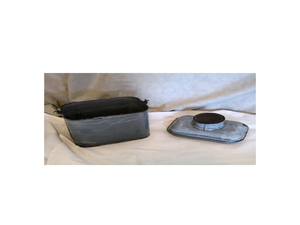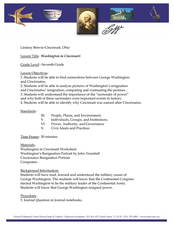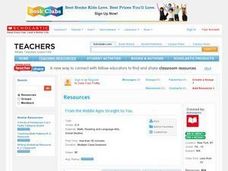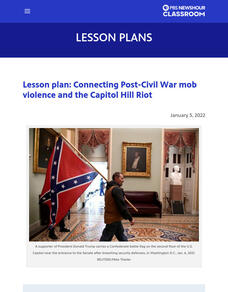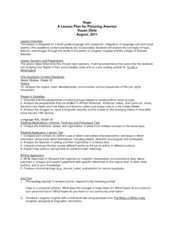Curated OER
Hitler¿¿¿s Fatal Gamble ? Comparing Totalitarianism and Democracy
Students compare/contrast totalitarianism and democracy and examine their roles in World War II. They read a handout, complete a Venn diagram, and participate in a class discussion.
Pennsylvania Department of Education
Comparing Two Versions of The Mitten
Students listen to two versions of the story The Mitten and create a chart or a Venn Diagram to compare the two versions. In this literary comparison lesson, students create a chart or Venn Diagram and discuss the differences in...
Curated OER
Task-based Grammar Teaching
Students compare a photo of themsevles now to a photo from ten years ago. They write how their life was different then from now and then present the information to the class.
Curated OER
Comparing Hares and Rabbits
Sixth graders research and investigate the Arctic hare and the snowshoe hare, and the order hares and rabbits. They explore an animal website and compare/contrast the two animals, recording their data on a chart.
Curated OER
Brush Lake State Park Indian Education For All Lesson Plan
Students, after exploring several secondary historical sources, compare/contrast their local history of the Brush Lake area, by viewing their own individual local histories. They assess contemporary cultures of the white homesteaders and...
Curated OER
Let's Celebrate Kwanzaa!
Learn more about Kwanzaa with a celebratory lesson. As learners analyze My First Kwanzaa Book by Debbi Chocolate, they compare and contrast the celebration to other holiday traditions they know about. Next, they prepare and...
Curated OER
Lunch Pail
Explore a 1900s lunch pail. In this oral language and 1900s history lesson, students view a photograph of an old-fashioned lunch pail. Students describe the object and make predictions about what it is and its possible uses. Students...
Curated OER
Washington in Cincinnati
Seventh graders compare and contrast the leadership of George Washington and Cincinnatus. In this historical perspectives lesson, 7th graders research the noted Web sites to answer questions about the 2 men.
West Virginia Department of Education
Editorials: The Guiding Voice of Authority?
How much can opinion influence a news story? A standalone resource discusses the importance of John Brown's Raid through the lens of journalism. Learners analyze two different texts, one from the perspective of the North and the other of...
Hood River County School District
Text Structure: Features and Organization
Teach learners how to interact with both fiction and non-fiction text with a packet of activities and worksheets. After looking over text structure and the difference in text features between different types of writing,...
Deliberating in a Democracy
Juvenile Justice
Pupils compare and contrast the legal system as it pertains to juvenile and adult crime and punishment. Incorporating primary documents, legal decisions, and video evidence, individuals form an argument debating the treatment of...
Curated OER
From the Middle Ages Straight to You
Learners read a "letter" from Dr. Suess' Bartholomew Cubbins and note differences between their lives and Bartholomew's. They utilize prewriting strategies to draft a letter of response to Bartholomew.
Scholastic
Pilgrim and Wampanoag Daily Life
A lesson looks at the Pilgrims and Wampanoag tribe during the first Thanksgiving. Scholars compare and contrast information presented by an online activity then discuss their findings. Learners examine the two group's daily routines and...
PBS
Connecting Post-Civil War Mob Violence and the Capitol Hill Riot
Anti-democratic violence is not new in the United States. Learners watch videos and then compare and contrast the 1873 Colfax and the 1898 Wilmington massacres. They then watch a video about the Capitol Hill insurrection of 2021 and...
Curated OER
Questions of Courage
Examine discrimination. In this character education lesson, learners read two biographies, Vivien Naki and Hamilton Naki then analyze their personal discrimination experiences. They complete a Venn diagram to compare and...
Curated OER
Picturing America: Images and Words of Hope from Romare Bearden and Langston Hughes
A carefully crafted three-day lesson integrates poetry and visual art. By analyzing and comparing Langston Hughes' poem "Mother and Son" and Romare Bearden's collage "The Dove," readers explore the theme of hope. The lesson activates...
EngageNY
Variability in a Data Distribution
Scholars investigate the spread of associated data sets by comparing the data sets to determine which has a greater variability. Individuals then interpret the mean as the typical value based upon the variability.
National Endowment for the Humanities
Life Before the Civil War
American life before the Civil War was very different from American life today. To show this difference in a full spectrum, learners compare two communities that illustrate the differences between Northern and Southern life. Throughout...
Armory Center for the Arts
Place Value Collage
How can art represent math? Use a lesson on place value collages to illustrate the different meanings that numbers have in their designated places. Kids observe photographs and paintings that show place value, then work on their own.
EngageNY
Why Do Banks Pay YOU to Provide Their Services?
How does a bank make money? That is the question at the based of a lesson that explores the methods banks use to calculate interest. Groups compare the linear simple interest pattern with the exponential compound interest pattern.
Newseum
The Women Who Made the Movement
Granting women the right to vote was a long time coming and took many efforts. Young historians select one woman involved in the suffrage movement to research. They compare and contrast the depictions of their subject in mainstream...
Texas Education Agency (TEA)
Maintaining Your Health and Well-Being
Future counselors and mental health professionals engage in two activities that give them insight into careers in human services. First, groups of four compare and contrast health and wellness apps and share their findings with...
Curated OER
The Poinsettia: Native Mexican Plant vs. U.S. Christmas
Students compare and contrast native Mexican poinsettia plants to those marketed in the United States. They watch a PowerPoint presentation, and listen to a version of the legend of the poinsettia. Students then create a paper pinwheel...
Delegation of the European Union to the United States
Structure of Government within the EU
The political system of the European Union is historically unique and has been constantly evolving. To better understand the structure of the EU, class members compare the EU's branches to those of the United States Federal Government.







